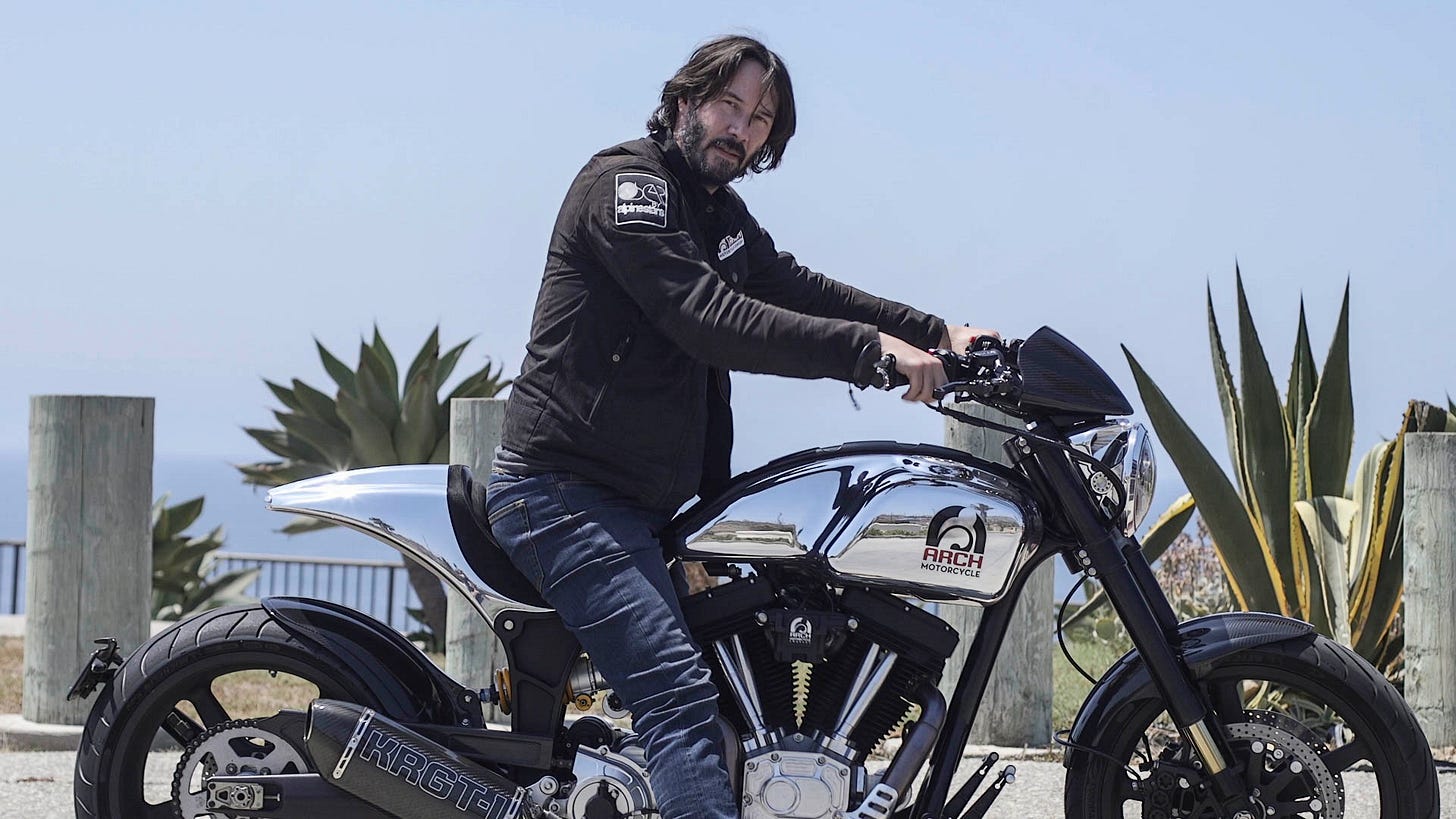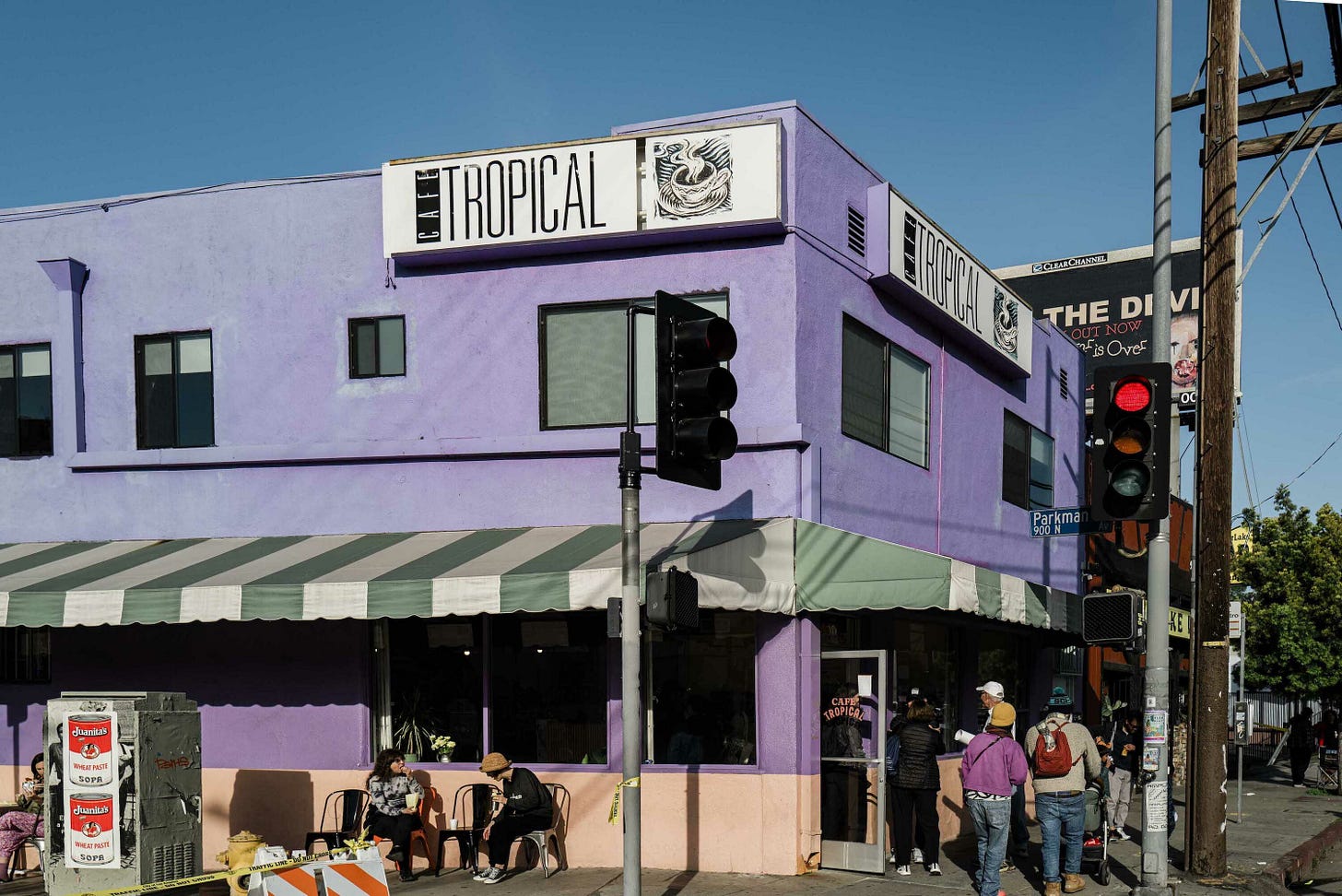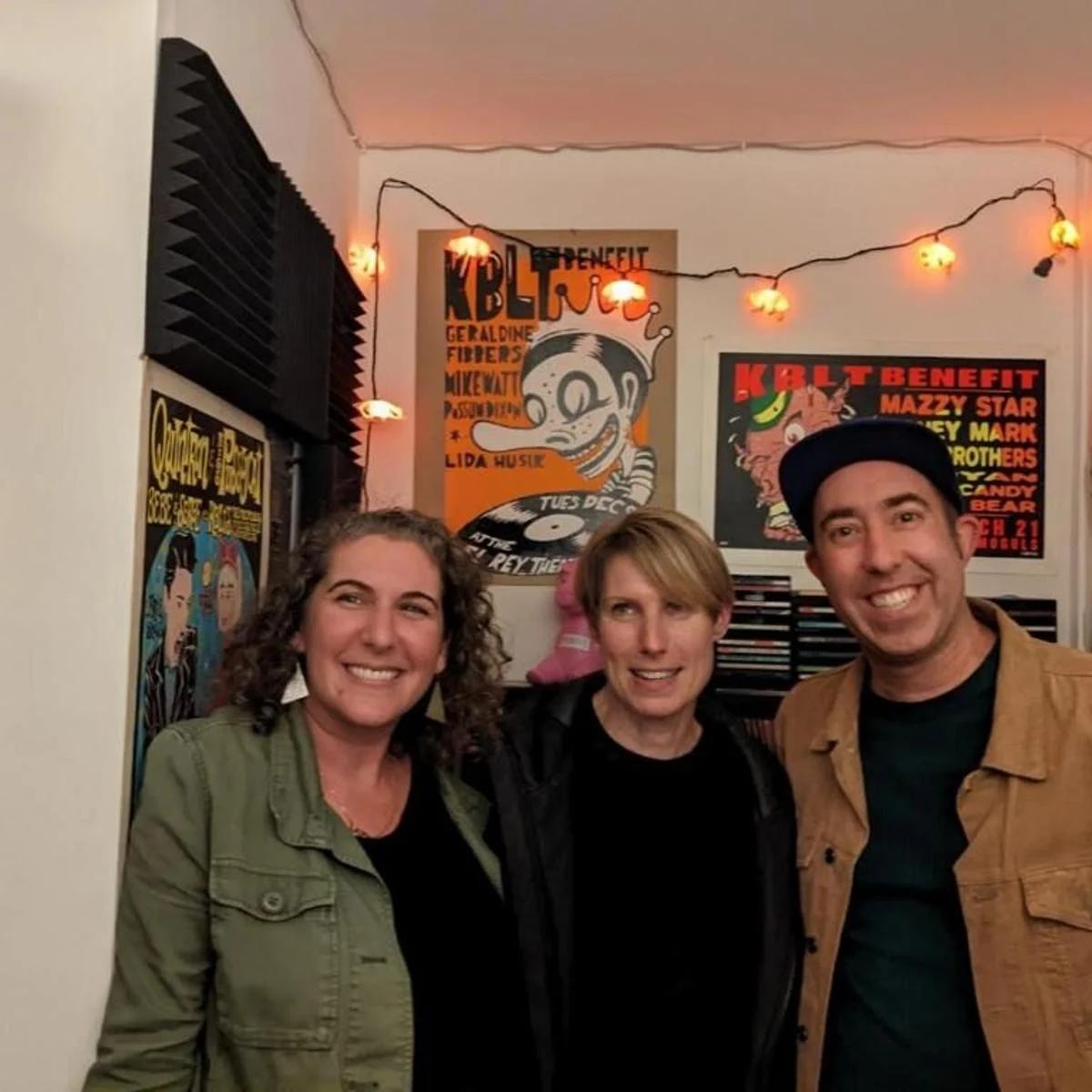Susan Carpenter: life in the fast lane
The journalist, the pirate radio host and the motorcyclist
This article was written in March 2023.
Susan Carpenter effortlessly drove her Tesla Model 3 through the streets of Silver Lake, Los Angeles, thinking about how much the neighborhood had changed since she had lived there some 30 years earlier. The area was more developed, with vibrant new shops and restaurants lining the streets.
Like Silver Lake, Carpenter was not the same. She no longer used the alias “Paige Jarrett” to hide her identity. She had a son: Carpenter Econn. Thirty years ago, Carpenter would also likely be tearing through Los Angeles on a motorcycle. No longer. Her great passion had been replaced by a great fear of pain and loss.
Yet, some things remained the same. Café Tropical is still on the corner of Sunset and Parkman, and Carpenter could not help but feel nostalgic as she sat down with a classic Cubano sandwich: pork, ham, gooey Swiss cheese, pickles, and mustard. Carpenter also retained a sense of ambition; a desire to be in control of her life regardless of the consequences.
In 1995, Carpenter sat at her desk at a law office in San Francisco and did not feel in control. She moved to California from the Midwest in 1992 and had served as a secretary since. She simply did not enjoy this line of work. It was time for a change. It was time to pursue something she loved. It was time to pursue radio.
Carpenter’s favorite radio station was run by college students at the University of San Francisco. The only problem with this radio station was that it stopped broadcasting music at 6 PM.
When USF’s radio station stopped broadcasting, Carpenter couldn’t bring herself to listen to commercial radio. In the 1990s, commercial stations had some of the same problems that they do today: too many advertisements and a heavy reliance on mainstream music. Carpenter wanted more “edgy stuff,” such as music by one her favorite bands The Jon Spencer Blues Explosion, a controversial band that combined the blues with rock. Then a thought presented itself: “I can do it better than the commercial stations are doing.”
But getting a radio license was not easy. When she was about to give up, a radio attorney introduced her to the pirate radio station concept. It was a dangerous idea as the FCC was starting to crack down on the illegal radio stations broadcasting on FM. If caught, Carpenter faced giving up all her equipment, paying a fine and even jail time. Despite this, Carpenter decided to commit to her new path.
First, Carpenter purchased a transmitter kit. In it was a circuit board and an extremely confusing set of assorted pieces. After failing in her attempt to build the transmitter, she swapped out her machine for a pre-built, 20-watt, functioning one. Soon she purchased an antenna, a mixing board, a microphone, and other necessary equipment to complete her setup in her tiny apartment in San Francisco. Carpenter started broadcasting KBLT.
Soon, Carpenter got a journalism job in Los Angeles and moved the station to Silver Lake. Her double life, legal during the day and illegal during the night, had begun.
As Carpenter entered the small apartment closet where she had hidden her studio, she “felt like a different person.” And she was a different person. She was no longer Susan Carpenter the journalist, she was Paige Jarrett the pirate radio host.
Jarrett had a different personality than Carpenter as she was admittedly “a little bit more of an asshole.” She understood the risks that came with running a pirate radio station, but she didn’t care. In fact, it was “thrilling” that she could get caught at any time. Sure, she was doing something illegal, but she was also doing something good. Because Jarrett believed in what she was doing, she had to “be wild, go for broke and do anything to make sure this survived.”
Constantly growing, Carpenter amassed over 80 DJs for KBLT during its lifespan. Many, including Chris Carey (aka Roky Manson), were attracted to the station’s freeform structure. They could play whatever they wanted without restrictions. Speaking about Jarrett, Carey was very impressed with her ambition. “She sacrificed the privacy of her own home to make one of the greatest stations of all time.”
In 1998, the walls rapidly closed in on KBLT as the FCC caught Jarrett. Carey recalls the paranoia of the weeks leading up to the shutdown, remembering hearing helicopters and seeing unmarked vans. The final song KBLT ever played was “Fuck Tha Police” by N.W.A. The FCC fined Jarrett around $10,000 and took her equipment. KBLT disappeared, and so did Paige Jarrett.
Carpenter still had her public, legal persona. Her efforts as a journalist earned her a job with the LA Times the same day KBLT was shut down.
The sound of cars passing by Café Tropical was suddenly amplified by the loud engines of four motorcycles driving at high speed. The smell of exhaust wafted in. Carpenter looked up and exclaimed, “Oh look at these assholes.”
When Carpenter moved to California, she could not afford a car. For a short time, she rode a bicycle which was quickly stolen and never recovered. Her boyfriend at the time introduced her to a new way of feeling free and in control: a $300, 1983 Suzuki GS400.
The Suzuki was a “clunker and not very good looking.” However, terror quickly disappeared for Carpenter and in its place grew a passion. With a motorcycle, she could get places much quicker than by bike or car. Motorcycling does come with significant risks, especially because there is little protection against impact with another object. Especially if that object is a moving car.
At the time, Carpenter loved motorcycles too much to care about the risks. “You will never feel more alive than when you are riding a motorcycle. It’s a very sensory experience. It’s not just a sense of speed but also about agility and control.”
The smell of car exhaust. The feeling of wind-resistance at high speed. The exposure to the elements. These are sensations one can not get in the closed space of a car.
Carpenter’s passion turned into her profession. Over her career, she wrote about motorcycles for the LA Times and the Orange County Register. Carpenter also made her return to radio (legally this time) as she was a contributor to KPCC-FM with her podcast “The Ride.”
Carpenter became established in the industry. And yet, because Carpenter is a woman, she experienced many difficulties. “I was by no means the first (female motorcycle columnist) but I was very high profile and that made it pretty rough.” When Carpenter worked at the LA Times, it was policy to read and respond to reader comments, some of which were sexist, negative comments attacking Carpenter as a person.
Carpenter “felt demeaned and unsupported by the LA Times,” which was a reason she left the company.
But Carpenter persevered because her love for motorcycles outweighed the difficulties. After a traumatizing incident in 2015, that would no longer be the case.

It was a typical day in Carpenter’s life. She was test riding a scooter motorcycle for the Orange County Register. A single mom, it was her job that day to pick up her son from summer camp. Carpenter intended to take him straight home, as she had done many times before, but he wanted to buy a paintball helmet in West Hollywood. They were just cruising through an intersection in Silver Lake when…
BAM! An older-woman in a car t-boned the scooter. While Carpenter escaped without major injury, her son was not left unscathed. His leg was broken in two places and his growth plate shattered. As Econn recalls, “the world started spinning” as he suddenly found himself and his mother lying in the middle of the street.
The crash resulted in a $60,000 lawsuit against Carpenter by her ex-husband. He sued to take her son away, claiming that she was a “reckless mother.” Ultimately, custody remained the same, but the family was hurting. Carpenter’s son had not only suffered physical pain but went through the emotional ringer of choosing a parent. As for Carpenter, she was hurt and angry.
Still employed at the Orange County Register, riding motorcycles remained a part of her job. Yet something was different. She started to feel fear. To her, the accident involving her son was a “wake up call.” Carpenter said, “To be on motorcycles you can’t be overly afraid, and I was starting to feel afraid. My kid only has one mom.” Soon, Carpenter sold her motorcycles, sacrificing her longtime love for her own and her son’s future.
Sitting at Café Tropical eight years after the accident, Carpenter finished her Cubano sandwich and smiled. Sure, she enjoyed driving around in her Tesla and yes it was safer. She looks forward to fully effective self-driving cars because maybe then there will be fewer people getting into accidents like the one she had gotten into.
Regardless, Carpenter missed the unparalleled combination of speed and control that she used to feel on a motorcycle. She still believed that riding a motorcycle was not a so-called “death wish,” but in fact a “life wish.” And yet, she still felt fear. Fear that she could get in another accident that affects her and her son.
Ironically, Carpenter’s son, now a college student at UC Berkeley, has always loved motorcycles, especially dirt bikes. He was inspired by his mother’s work, just as many others were by Susan Carpenter and Paige Jarrett. After he graduates, he and Carpenter are planning to go to Japan. This would not just be a regular vacation, however. It would be a motorcycle tour across the country. It would be a time when both she and her son could feel truly alive and in control of their lives together.







